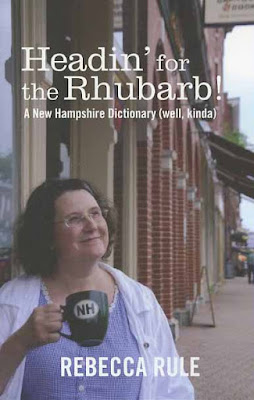... so they say.
While the deadline for removing bob houses from New Hampshire lakes and ponds is not until April 1, I would not recommend waiting until then.
If you do, you are just "headin' for the rhubarb."
Colloquially that phrase means you are about to "get into trouble," as explained in Rebecca Rule's New Hampshire dictionary of the same title.
You can find her book in several libraries in the Mount Washington Valley. See this link here.
However, phrases can have multiple meanings, or layers of meaning. In another, seasonal sense, the title of this blog can refer to the traditional role of heading towards the season of rhubarb, one of the early crops we harvest fresh up here.
Historically in New England the rhubarb harvest is an almost sacred celebration as it represents the end of winter, the end of fear from famine and the promise of a new beginning.
However in New England, the transition from winter to spring is not often quick nor consistent.
While the astronomical beginning of Spring started more than a week ago, it will still be a bit before we can actually harvest the rhubarb.
It will be almost two months before the cows go out, so historically farmers would check the hay left in the barn this time of the year.
For most of us, this time of scarcity is more of an inconvenience than an actual struggle between life and death as it was for many in the past.
Meteorologically winter has returned with a vengeance. We hear the weather on the nightly news punctuated with terms like wintry mix (sleet, snow and rain), arctic blasts, record cold and a frigid feel due to the wind chill.
Charles Dickens wrote about this climatic variability when he said “It was one of those March days when the sun shines hot and the wind blows cold: when it is summer in the light, and winter in the shade.”
Other writers have sung the promises of spring and the harvest to come. Our own Eaton Poet, Thomas Randall wrote in his poem entitled "Birth of Spring and Death of Winter" that ...
Phebus comes with brilliant rays,
Cuts short the nights t' increase the days;
He now forsakes the southern pole,
Around the northern start to roll.
Phebus in Greek mythology is also known as Apollo or the sun.
To learn more about the science behind the seasons see our previous blog here.
In the last stanza he writes...
Here now I'll drop these scatter'd lines,
And hope and wish for better times,
When nature all shall join and bring
Some livelier airs that all may sing.
FMI see this link here.
This optimism of spring is tempered by another, bit more well-known poet, Robert Frost. In "A Prayer in Spring" he opines...
And give us not to think so far away
While he refers to the pleasure of spring and the promise of the harvest, he continues...
As the uncertain harvest; keep us here
All simply in the springing of the year.
His underlying theme is to both enjoy the moment, hope for the best, but prepare for the worst.
All simply in the springing of the year.
His underlying theme is to both enjoy the moment, hope for the best, but prepare for the worst.
I had a lot to learn about New Hampshire when we moved here more than a quarter century ago. For one thing, I learned that I will always be a flatlander.
In her dictionary, Rebecca Rule says in New Hampshire a flatlander is anyone born south of the state line. For those born in the White Mountains a flatlander is anyone born south of the notches. And for those hardy few who man the observatory on top of Mount Washington, a flatlander is everyone but them.
I literally had to learn to read the signs of Spring. Instead of flowers in March, we get bright orange signs that read "Frost Heaves."
You can read our previous blog on wicked nasty frost heaves and politics here.
I discovered that perhaps the best solution is to laugh it off. See our previous blog here about the droll Yankee approach which coincidentally connects mud, hats, maps, bird feeders and local history.
In her dictionary, Rebecca Rule tells a short story about frost heaves and politics, but I will leave it up to you to check out her book to read it.
During mud season the towns also post signs reading "Load Limits." I had to look that up too.
Another "must read" Rebecca Rule book is Moved and Seconded. Town Meeting in New Hampshire, the Present, the Past, and the Future.
You can find info about the book here. You can visit the Conway Public Library's Henney History Room to view our collection of town reports, ledgers and papers for the history of Conway. The Conway Public Library also offers a free public program on all things spring and seasonal for local schools and community groups.
Not that long ago Conway went to an SB2 form of Town Meeting with the town elections and final voting on the town warrant articles coming up April 12.
Now that's what I call headin' for the rhubarb!











